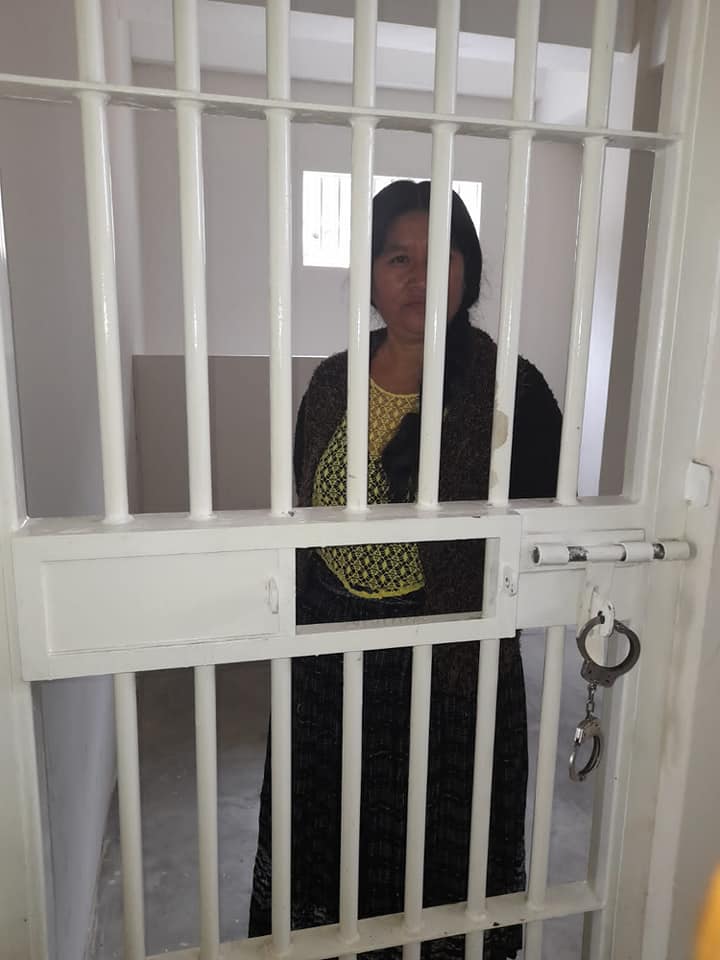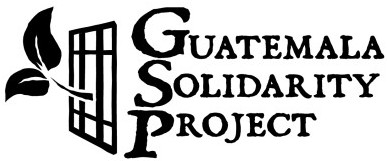Resisting Election Fraud and Starvation as US Backs Repression: Guatemala Solidarity Project Quarterly Report
We are publishing this quarterly report to update you on our work and request your continued solidarity with our partners via donations, contacting congress, spreading the word or volunteering with us in Guatemala or the US! It is more important than ever to stand in solidarity with our partners. As the corrupt elite in Guatemala try to overturn the surprising June 25 presidential election results, the US government is helping US and Canadian companies further profit from the illegal Fenix mine and its use of gang rape, arson attacks, assassination of community leaders and forced displacement of entire villages. Below we will briefly summarize some of the important areas of our work.
An easy way to take action right now is by making a donation. No funds are used to support our lobbying efforts or any costs in the US. Instead, all donations go directly to our partners to support their priorities on the ground, including bringing teachers to abandoned communities, providing medical care for thousands of people, setting up basic water filtration systems, visiting indigenous human rights defenders in prison and supporting their health and legal needs, and related work. No funds are kept by the GSP for “overhead” or any other purpose, so donations of any size can have a bigger impact. You can donate via Venmo @SolidarityGuate (search under business), our website or by writing a check to UPAVIM and mailing it to UPAVIM, PO Box 63, Marshfield, VT 05658. We thank our fiscal sponsor, the volunteer-run UPAVIM Community Development Foundation, a US 501(c)3 non-profit tax-deductible organization, for supporting us and ensuring that all funds go to our partners in Guatemala.
Healthcare & Music Solidarity Delegations
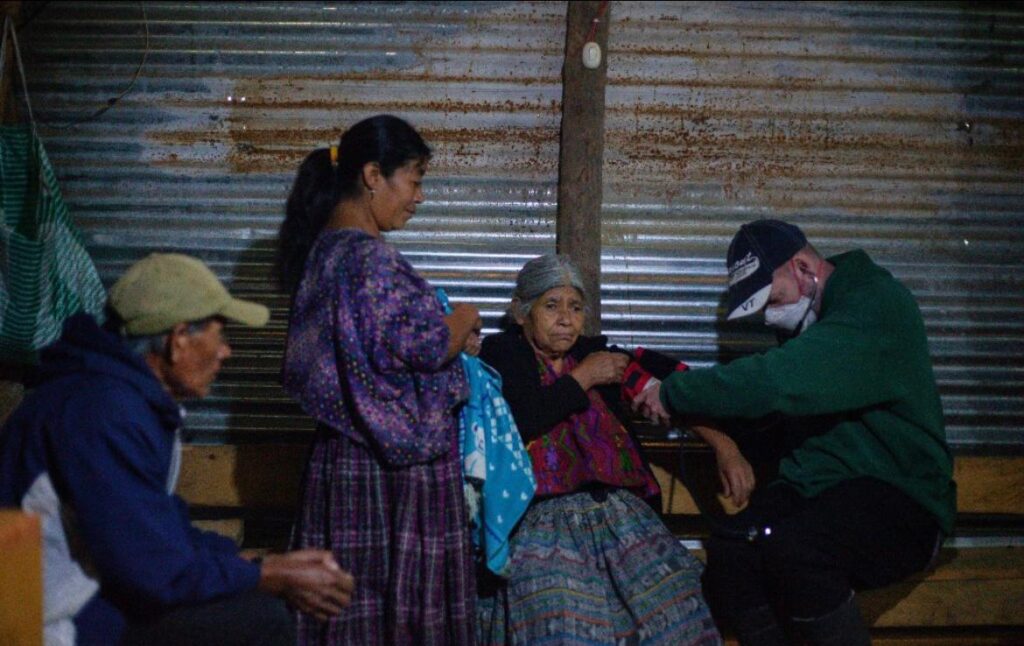
We are looking for healthcare workers, musicians and other people in solidarity to join us in Guatemala for either of our upcoming Healthcare & Solidarity Delegations which will take place January 3-9 and 9-15, 2024. In our previous international delegations in January 2023, we treated nearly 1,000 people primarily in indigenous communities targeted by multinational corporations for the natural resources in their territory. Our medical work is carried out throughout the entire year and led by our amazing community health nurse, but these delegations are a great opportunity to directly support, learn from and unite with our partners.
Malnutrition, pneumonia and parasitic infestation are some of the most common health issues we confront. In the context of poverty and malnutrition, otherwise easily treatable common illnesses can become fatal for children whose bodies are weakened from lack of food and whose families don’t have access to even basic medications like Tylenol.
Musicians are needed to lead informal concerts, presentations and workshops. Our partners have prioritized musicians because they are in communities that have been abandoned or worse. Their access to music has been limited and while their greatest desire is for justice, they also want to experience and share the joy that live music can bring.
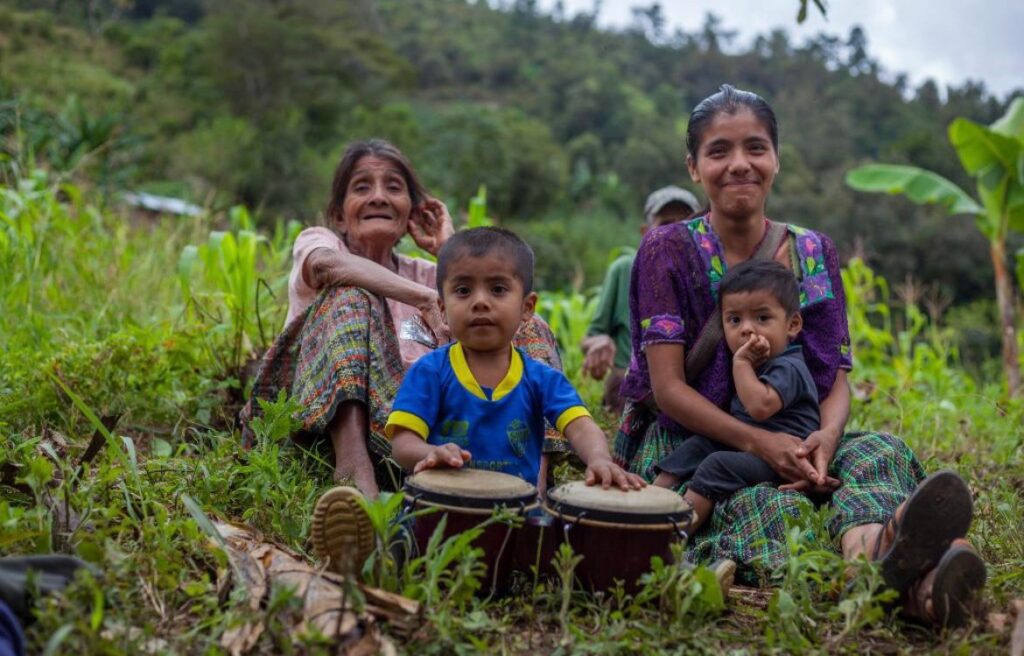
There is a great need for participants who are neither healthcare workers or musicians. This includes everything from helping document the experience to assisting in setting up physical spaces for clinics, and more. If you are interested in joining one or both delegations, click here for more information.
Biden Administration Helps US, Canadian Corporations Profit from Illegal Fenix Mine
The Fenix Mine has become one of the largest nickel mines in the hemisphere by using gang rape, arson attacks and assassination of indigenous leaders to expand its territory. Despite being worth over a BILLION dollars, indigenous communities surrounding the mine are living in extreme poverty and hunger. GSP healthcare leaders have helped prevent starvation in the area, but we have also been forced to let people starve to death when US-backed security forces prevent travel to the region during crack downs on local protest movements.
In 2019 and 2020, the Constitutional Court of Guatemala ruled that the mine had been operating illegally in indigenous Q’eqchi’ territory for decades and must be shut down. The project and its multinational owners have been accused of using arson attacks, gang rape and assassination of indigenous leaders to illegally expand operations. The court ruled that the mine must remain shut down until the area indigenous population approves the project.
The company and government ignored the ruling and continued to operate the mine, and in 2021 indigenous leaders put their bodies on the line and courageously blocked the road leading to the mine. The powerful US-backed security state of Guatemala responded by attacking protestors, and police and soldiers marched alongside mining equipment to continue the illegal operation.
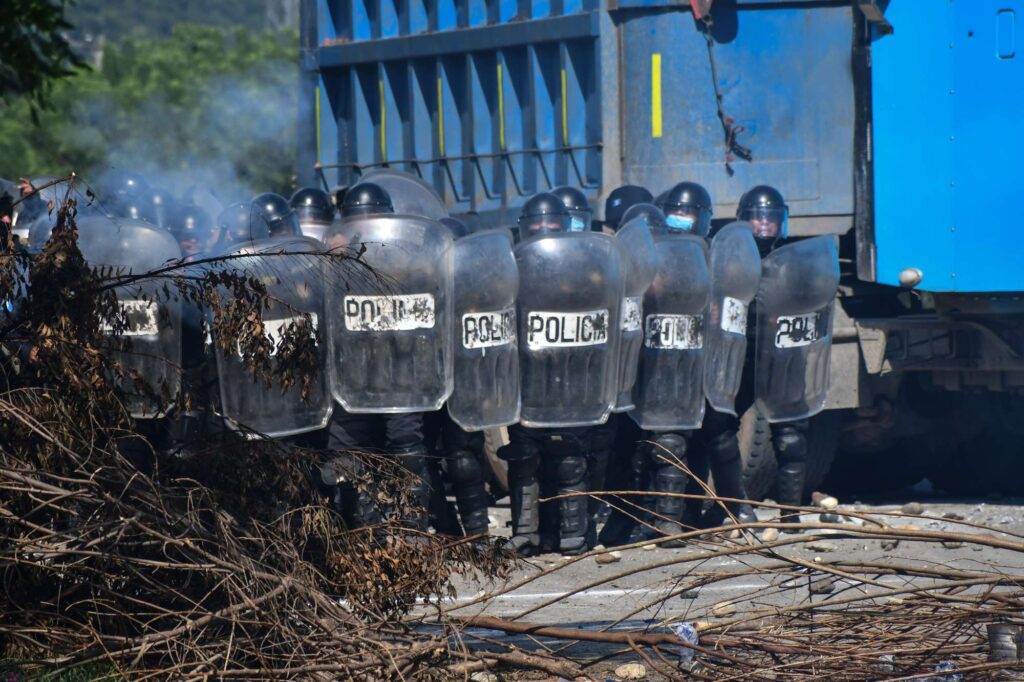
The government then declared a curfew and Martial Law in the area, making protests illegal and giving the military special powers to raid homes of activists and make arrests. Journalists who covered the violence were arrested, and the homes of plaintiffs in rape and murder cases were raided.
Instead of recognizing this as the human rights disaster that it is, the Biden Administration viewed the situation as an opportunity for corporate profit. In April of 2023 Newsweek exposed that the US government is providing hundreds of millions of dollars in subsidies to US and Canadian corporations to support the purchase of the mine from its current owner, Switzerland-based Solway Investment Group.
Please contact your members of congress and ask that they publicly condemn this support, and call for the Biden Administration to immediately stop supporting Guatemalan security forces and mining, energy and related projects that occur on indigenous land without consent from indigenous people.
Progressive Presidential Election Victory Blocked by Guatemalan Courts
Presidential elections were held in Guatemala on June 25 in the context of repression of journalists and opposition leaders. Numerous candidates were barred from running, including leading opposition candidate and indigenous human rights defender Thelma Cabrera. Cabrera had finished just behind current President Alejandro Giammattei in the 2019 election and had been expected to have an even stronger showing this year.
The two candidates who receive the most votes then move on to a final round in August. It was clear before the election that one of those candidates would be Sandra Torres. Torres has a small but committed base, and this would be the third consecutive election that she moved on to the second round. She is strongly disliked by a majority of Guatemalans for her alleged connections to corruption and drug trafficking, and it has been assumed that whatever candidate moves on to the second round with her will be the eventual winner. In both the 2015 and 2019 elections, Torres finished in the top two in the first round and then was easily defeated in the second round.
The only question then seemed to be what other candidate would move on to the second round as the heavy favorite to become the next president of Guatemala. Right wing candidates supported by the military and economic elite had received massive undisclosed campaign donations and were constantly seen or heard on television, radio and billboards throughout the country. This included Zury Rios, the daughter of former dictator Efrain Rios Montt who was convicted of genocide after leading US-backed massacres of indigenous people in the 1980s. Zury Ríos had previously been barred from running due to laws preventing close relatives of former dictators from being presidential candidates. While leading opposition figures were barred from running this year, Zury Ríos was not, largely due to the control established by elites at the Constitutional Court. While directing a “scorched earth” policy of massacres and public mutilation of pregnant women in the 1980s, Efrain Rios Montt received significant support from leading US evangelicals. Pat Robertson frequently called on viewers of his The 700 Club television show to call congress in support of President Ronald Reagan’s arming of the Guatemalan military. Zury Ríos called her father her inspiration, and was seen as the leading candidate of the evangelical community in the 2023. With this support, many commentators predicted she would move on to the second round.
In a shock unimagined by the press or political elite, progressive candidate Bernardo Arevalo finished well ahead of Zury Ríos and other right wing candidates after campaigning against corruption and in favor of new schools and health centers. Arevalo’s father, Juan Jose Arevalo, was Guatemala’s first ever democratically elected President in 1944 after a massive nonviolent movement ended the rule of US puppet dictator Jorge Ubico. Arevalo and his successor Jacobo Arbenz ended legal repression of indigenous people and supported labor rights, and as a result the US bombed Guatemala, installed a series of dictators, and funded decades of genocidal civil war. Bernardo Arevalo is not a revolutionary like the barred candidate Cabrera, but he is firmly against corruption. This stance has forced Guatemala’s infamous “Pact of the Corrupt” that has ruled government with unconditional US support to attempt to void the election results.
One week after the election, Guatemala’s notoriously corrupt Constitutional Court ruled that the results would be “suspended” and that Arevalo could not move on to the second round pending a recount and future court deliberations. In addition to questions about the court’s competency to hear the frivolous suit by ten losing parties, Arevalo also finished so far ahead of the right wing candidates that legitimate recount couldn’t possibly result in enough of a difference to change that.
As protests spread throughout Guatemala in response to this developing situation, please contact your members of congress and ask them to call for an end to interference with the Guatemalan presidential election.
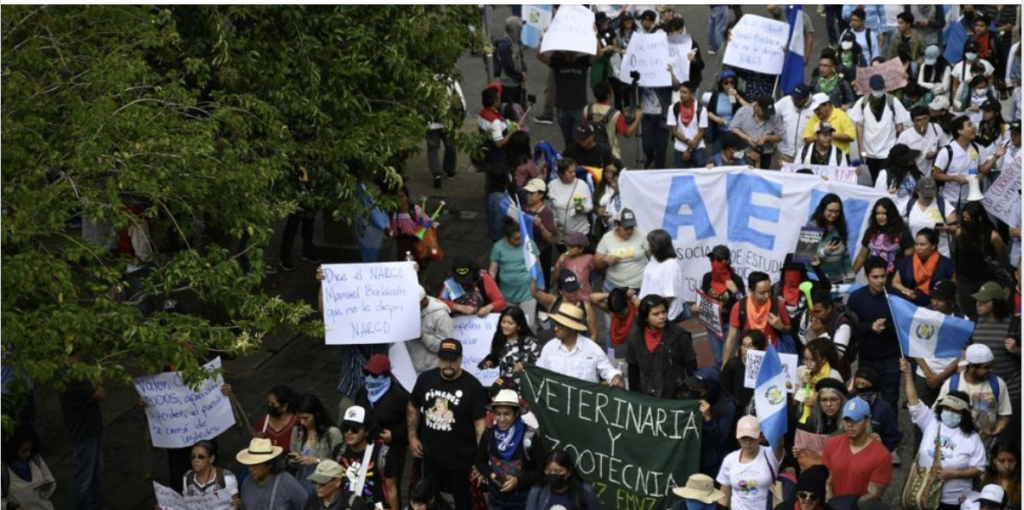
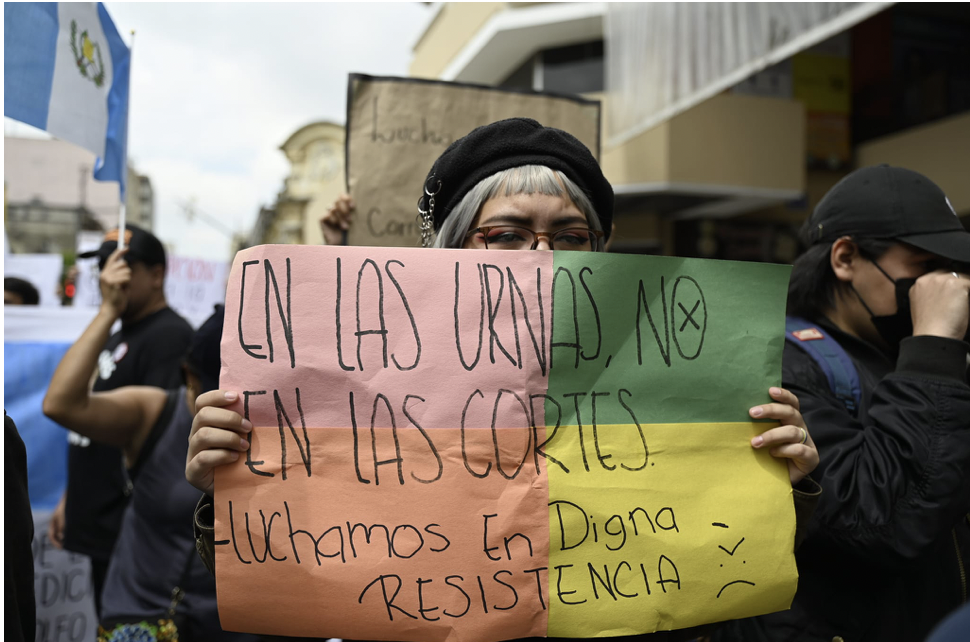
Mobile Schools Continue, but Children have Dramatically Limited Resources
The GSP continues to operate our mobile school program, providing basic education access to hundreds of children in indigenous communities that have been denied their legal right to education. However we need your support to guarantee these children at least have the minimum access to notebooks, writing utensils and shared books needed to learn. Please make a donation of any size today.
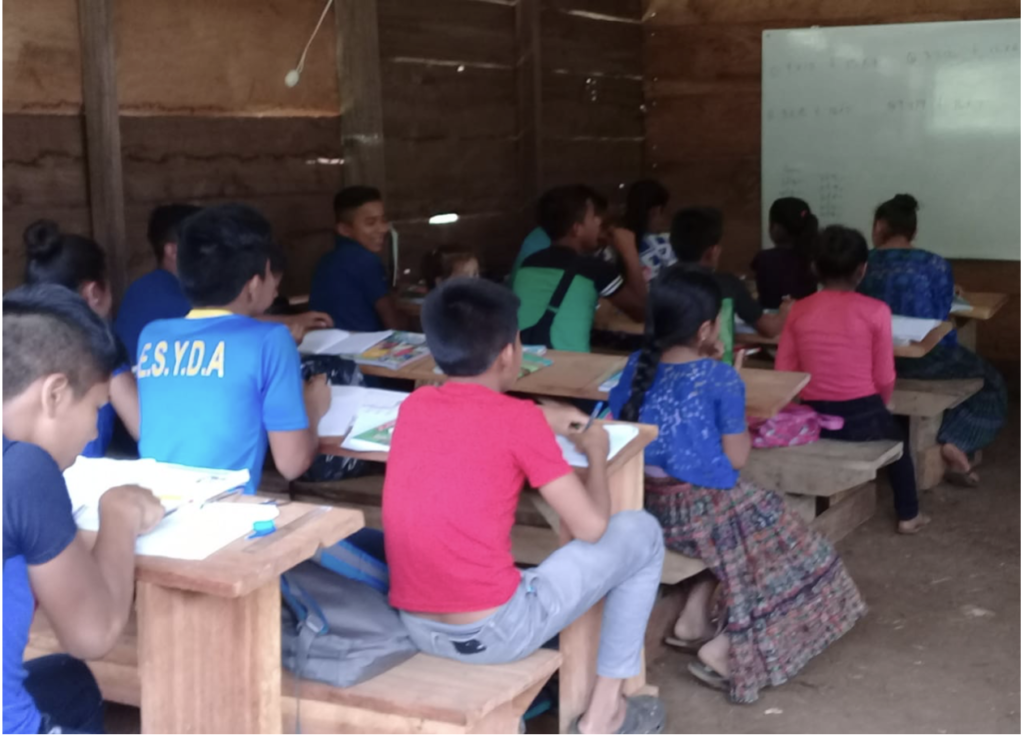
Sofia Tot update
Indigenous activist and GSP Advisory Board member Sofia Tot Ac was arrested under false pretenses on June 19, 2022. Sofia was released the following day but is currently facing the possibility of years in prison for the ridiculous charges of “aggravated theft” and “aggravated usurpation of protected areas.” The charge of stealing land in protected areas is especially ridiculous given Sofia’s leadership in denouncing illegal mining and hydroelectric operations in protected areas.
Sofia holds numerous leadership positions at the community and regional level. She is a coordinator with the Achi’, Q’eqchi’, Poqomchi, and Kaqchikel Mayan Peoples’ Council. She is the founder of the Motherhood Home in Salama, Baja Verapaz. She is the coordinator of Social Outreach for the Catholic Church in the Parish of Purulhá. She is a representative of the Q’eqchi’ People in the State and Regional Development Council. Sofia has collaborated with the GSP for over 15 years and directly coordinates much of our work on the ground. Sofia is a leader with several other organizations, and her arrest was in retaliation for her commitment to human rights.
Sofia’s next hearing is scheduled for July 27. Please stay informed and help us publicize related calls for solidarity about Sofia and other partners in Guatemala by following us and liking/forwarding our posts on facebook (GuatemalaSolidarityProject), instagram (GuatemalaSolidarityProject) and twitter (@SolidarityGuate).
